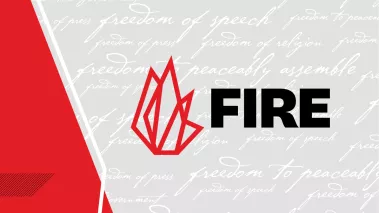Table of Contents
'Editor & Publisher' Article Overlooks Supreme Court Precedent

Sandy Davidson wrote for Editor & Publisher last week to criticize free speech advocates who argue that the First Amendment should protect university newspapers just as it protects private newspapers.
FIRE is, of course, among such free speech advocates, and it is disappointing to see Davidson, a professor at the University of Missouri's School of Journalism and School of Law, support censorship and take such a narrow view of freedom of the press. Davidson's article, though, displays more than just a failure to appreciate the principles of free speech that might guide a moral analysis of this issue. It overlooks important Supreme Court precedent — rulings that public universities are legally bound to follow. Davidson starts by asking and answering her own misleading question: What does First Amendment freedom of the press mean, freedom to write anything one wants, whether it be inaccurate, libelous, invasive of privacy, offensive, or just plain stupid?
Unbridled freedom!
Readers should be extremely skeptical of anyone who starts a pro-censorship argument by implying that free speech advocates are trying to defend even those categories of speech that the Supreme Court has ruled are unprotected — e.g., libel. But to be clear, the First Amendment does protect the freedom to write "offensive" and "just plain stupid" ideas (whatever that may mean in practice).
So does the First Amendment mean unbridled freedom? No. But it does mean that the government can't censor articles just because they are deemed "offensive."
Davidson next argues that the Supreme Court has not yet explicitly ruled on whether college newspapers may be censored under the precedent of Hazelwood School District v. Kuhlmeier (1988), which held that a high school could regulate the content of a newspaper published as part of a journalism class, in part because such a newspaper bears the school's imprimatur.
While courts have mistakenly applied Hazelwood beyond the circumstances one could anticipate from the case's very narrow holding, that does not mean it may be applied to independent college newspapers that do not bear the school's imprimatur. In fact, the Supreme Court has explicitly and consistently emphasized the importance of strong First Amendment protections on university campuses. In Healy v. James (1972), the Court rejected the idea that "First Amendment protections should apply with less force on college campuses than in the community at large. Quite to the contrary, ‘the vigilant protection of constitutional freedoms is nowhere more vital than in the community of American schools.
Former FIRE Jackson Fellow Kelly Sarabyn has written on the historical and commonsense reasons why college students should be free from the speech restrictions placed on high school students. Since the passage of the 26th Amendment, Americans who have reached the age of 18 can vote, fight in wars, sign contracts, and enjoy innumerable other legal benefits that come with being an adult. College students are overwhelmingly adults, and it is inappropriate to abrogate their free speech rights as if they are children.
More specific to the student newspaper context, in Papish v. Board of Curators of the University of Missouri (1973), the Supreme Court protected students' rights to publish in their campus newspaper the headline "Motherfucker Acquitted." The per curiam opinion reads:
We think Healy makes it clear that the mere dissemination of ideas — no matter how offensive to good taste — on a state university campus may not be shut off in the name alone of "conventions of decency."
How does this statement square with Davidson's implication that it would be ridiculous to assert a right to publish "offensive" speech?
Davidson then argues that allowing student journalists to write "anything [they] want" will make universities vulnerable to lawsuits for "libel and other torts." The content of a student newspaper, legally speaking, represents the viewpoint of the students who write it and not of the school. The Court explained this principle in Rosenberger v. Rector and Visitors of the University of Virginia (1995), which held that a university does not violate the Establishment Clause of the First Amendment by allowing a student group to publish a religious magazine, even using student fee funds.
The Student Press Law Center (SPLC) explains in depth on its website why courts have consistently held that public universities are not liable for student press content under a theory of respondeat superior or agency. As SPLC notes:
First Amendment precludes universities from prior review of independent student newspapers. A school cannot be held liable for something over which it cannot exercise any control. Therefore, public universities cannot be held liable for newspaper content that they merely allow to be published.
Further, Davidson's comparison to radio broadcasts is disingenuous, since Federal Communications Commission v. Pacifica Foundation (1978) makes clear that indecent speech may be censored in that context because of considerations unique to that medium.
Journalism schools should teach and encourage responsible reporting. But Supreme Court precedent makes clear that public universities are bound by the First Amendment, and it is disappointing to see a journalism professor lose sight of this vital principle.
Recent Articles
Get the latest free speech news and analysis from FIRE.

Can the government ban controversial public holiday displays?

The trouble with banning Fizz

FIRE's 2025 impact in court, on campus, and in our culture
